-

人教版新目标初中英语九年级下册By the time I got outside, the bus had already left教案
Ⅰ. Teaching Aims and Demands1. Knowledge Objects(1) Key Vocabularyoversleep(2) Target LanguageWhat happened?I overslept. And by the time I got up, my brother had already gotten in the shower.2. Ability Objects(1) Teach the students to use the new words.(2) Train the students to narrate past events with the Past Perfect Tense.(3) Train the students' listening and speaking skills with the target language.3. Moral ObjectIt’s a good habit to go to bed early in the evening and get up early in the morning. So you’ll never be in a hurry in the morning.Ⅱ. Teaching Key Points1. Key Vocabularyoversleep2. Target LanguageNarrate past events with the Past Perfect TenseⅢ. Teaching Difficult Points1. Train the students to narrate past events with the Past Perfect Tense.2. Train the students to understand the target language in spoken conversation.Ⅳ. Teaching Methods1. Thinking of examples from the students' real lives.2. Making sentences by looking at the pictures.Ⅴ. Teaching AidA tape recorderⅥ. Teaching ProceduresStep I Revision1. Revise the language points in Unit 8.Ask some questions like this: What volunteer work would you like to do?Help the students to answer, I’d like to…/I love to…/I hope to2. Practice the dialogue in Activity 3c on page 62 again. Get students to role play the similar dialogues with the following.
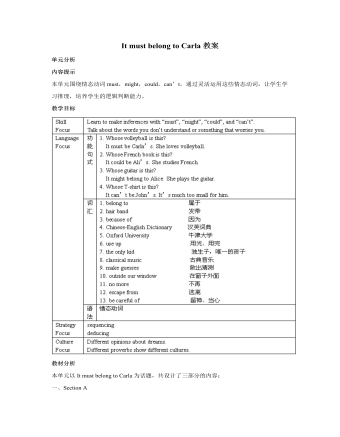
人教版新目标初中英语九年级上册It must belong to Carla教案
一、Section A该部分有4个模块。第一模块围绕Whose volleyball is this? 这一话题展开思维( 1a)、听力(1b)、口语( 1c)训练;第二模块围绕上一模块中的话题进行听力( 2a-2b)、口语训练( 2c);第三模块继续围绕前两个模块中的“making inferences”展开训练。训练形式为阅读排序( 3a)和两人问答(3b);第四模块仍就上一话题展开讨论。二、Section B该部分有4个模块。第一模块要求根据图画和所提供的单词写出合理的句子;第二模块在听力( 2a-2b)和分角色口语训练( 2c)的基础上,继续进行“推测”训练; 第三模块围绕“Strange events in Bell Tower neighborhood”这一话题展开阅读( 3a)和写作(3b -3c)训练;第四模块以dream为话题展开小组活动。三、Self Check该部分有3个模块。第一模块以填空形式对所学词汇进行训练;第二模块就8个谚语展开阅读和讨论。

人教版新目标初中英语九年级上册Where would you like to visit教案2篇
The First PeriodⅠ.Teaching Aims and DemandsKnowledge Objects(1) Key Vocabularytiring, educational, fascinating, thrilling, peaceful, exotic, trek, jungle, take it easy, explore, historic, site(2) Target LanguageWhere would you like to go on vacation?I’d like to trek through the jungle, because I like exciting vacations.2. Ability Objects(1)Train students to talk about places they would like to visit with the target language.(2)Train students to describe vacations with different adjectives.(3)Train students' listening skill.3. Moral Object,It′s more interesting to go on vacating somewhere instead of staying at home.Ⅱ. Teaching Key Points1. Key Vocabularytiring, educational, fascinating, thrilling, peaceful, exotic, trek, jungle, take it easy, explore, historic, site2. Target LanguageTalk about different places with the target language.Ⅲ. Teaching Difficult Points1. Describe vacations with different adjectives.2. Talk about different places with the target language.Ⅳ. Teaching Methods1. Teaching by illumination2. Teaching by doing chain drills3. Teaching by pairworkⅤ. Teaching Aids1. A tape recorder2. Some pictures of different places with famous views

人教版新目标初中英语九年级下册Rainy days make me sad教案
1. 教材分析本单元以how do things affect you?为话题, 从颜色、天气、音乐、广告、产品等方面谈论了外界事物如何影响人的心情。要求学生掌握表达某物或某事给人带来的感觉、看法或影响等。共设计了四个部分的内容:Section A 该部分有4个模块:第一模块围绕Which restaurant would you like to go to?这一话题展开思维(1a)、听力(1b)、口语(1c)训练;第二模块围绕How does music affect you? 进行听力(2a-2b)、口语训练(2c);第三模块继续围绕how do colors in the restaurant affect you这一话题展开训练,训练形式为阅读和问题体验(3a)和小组活动(3b);第四模块仍就How do things affect you这一话题以调查的形式展开讨论。Section B该部分有4个模块:第一模块围绕产品广告对人们的影响这一话题以“配对”(1a)与“列举”(1b)两种形式展开训练;第二模块继续围绕How do things affect you? 进行听力(2a-2b)、口语对话训练(2c);第三模块围绕“Advertising”这一话题展开阅读(3a-3b)和写作(3c)训练;第四模块围绕How posters affect you这一话题以口语训练形式展开小组活动。

人教版新目标初中英语九年级下册Could you please tell me where the restrooms are教案
Step Ⅰ RevisionCheck homework. Ask a few students to read the article in 3a.Then ask a few students to read their guides.Step Ⅱ Part 1Look at the words in the box. Ask a student to read them. Make sure the students understand the meaning of the words. You are to fill in the blanks with the words. In some cases, students may need to use another form of the word, for example adjusting for tense or subject/ verb agreement.Ask students to fill in the blanks on their own.Check the answers. Step ⅢPart 2Go through the instructions with the class.Look at the example with the students.Ask students what the answer would be.Ask a student to read the question and answer it.Excuse me, could you tell me where the bank is, please?The bank is across the street from the shopping malt.Get students to complete the work in pairs.Check the answers. Ask a few students to read their questions.Step Ⅳ Just for Fun!Ask all the students to read the conversation. Ask: What is funny about this cartoon? Help students to explain. A Martian is a person from the planet Mars.There is no such thing as Martian food on Earth, and the clerk looks silly because he is trying to think of where there is a Martian restaurant.Invite some pairs of students to present this conversation to the rest of the class.Step Ⅴ Summary and HomeworkIn this class, we’ve done much writing practice using the key vocabulary words and the target language presented in this unit. After class, please finish the questions in 2 in your exercise books. Then finish the exercises on pages 47~48 of the workbook as well.The Seventh Period Ⅰ Teaching Aims and Demands1. Knowledge Objects(1) Key Vocabularyimage, adventure, jealousy, hero, crime, journey, brave, no longer, show interest in, take it easy, become interested in, plain looks(2)Text:Grown-ups like cartoons, too.2. Ability Objects(1) Fast-reading to get a general idea of the text.(2) Careful-reading to get the detailed information in the text.

人教版新目标初中英语九年级下册I’ll help clean up the city parks教案
Talk about offering help (P60)I’ll help clean up the city parks.A: I’d like to work ...B: You could help ...Talk about ways to tell people about the Clean-Up Day (P61)We need to ...We can’t ...I’ll ...Talk about the work the volunteers do (P62)These three students all volunteer their time to help other people.Somebody loves to ... / helps ... / plans to ... / wants to ...A: What do you like doing?B: I like ... A: What kind of volunteer work do you think I could do?B: You could ...1. 重点词汇advertisement, fix, repair, pleasure, blind, deaf, shut, carry, specially, fetch2. 认读词汇hunger, homeless, cheer, clean-up, sign, establish, major, commitment, elementary, veterinarian, coach, similar, call-in, strategy, disabled, organization, unable, support, appreciate, donation, part of speech, pronoun, adverb, preposition, conjunction, donate, Jimmy, Sally3. 词组clean up, cheer up, give out, put off, set up, think up, take after, fix up, give away, put up, hand out, work out, at once

人教版新目标初中英语九年级下册We’re trying to save the manatees教案2篇
本单元主要围绕着有关濒临灭绝的动物这一话题,学习了应该怎样保护我们的环境,以及就某一问题展开辩论。目标提示语言目标能够运用所学知识,就某一问题展开辩论。认知目标1、复习一些语法:现在进行时、一般现在时、用used to 表示一般过去时、现在完成时、一般过去时的被动语态。2、学会表达同意和不同意。3、学会以下基本句型:We’re trying to save the manatees.Manatees eat about 100 pounds of food a day.There used to be a lot of manatees.In 1972,it was discovered that they were endangered.Some of the swamps have become polluted.情感目标了解一些濒临灭绝的动物的生活习性和濒临灭绝的原因,教育学生应该如何保护环境。教学提示充分利用多媒体等教学设备,创设与本课话题相关的情境,如各种不同种类的动物、动物园以及有关环境的画画等等。围绕着本单元的教学目标,设计一些贴近学生实际的教学任务,如让学生谈论自己最喜欢的动物,如何拯救濒危动物,如何保护环境等等。让学生根据所学知识,就动物园是否对动物有利以及其他的话题进行辩论。

人教版新目标初中英语九年级下册You’re supposed to shake hands教案
教学目标:1. 掌握本单元一些重点词汇的写法和用法。2. 学会自如谈论餐桌礼仪。Step 1 RevisionAsk some students to retell the customs at the table in France in the passage in 3a.Step 2 Self checkPart 1. Fill in each bland with the correct word given. Students do the exercises by themselves at first. Then check the answers. Ask the students to comprehend the sentences and help them point out uses of some words, like “arrive (at / in) sw., spend time / money on sth , spend time / money (in) doing sth.”Part 2. Read about Fan Ling’s experience in a western restaurant. Understand the passage. Point out some key points in the passage.1. be / get used to doing sth. 习惯做某事2. begin with = start with 以….开头3. crowd v. 挤满,塞满 the crowd 人群 crowded adj. 拥挤的Then students discuss about how she would solve her problem. Ask some to share their stories with others.Part 3. Complete the crossword by looking at the sentences on the left. Then check the answers.

新人教版高中英语必修1Unit 1 Teenage Life-Listening and Speaking & Listening and Talking教案
Step 2 Listening and Talking1. The teacher is advised to talk with their new students about the related topic: Boys and girls, do you know some structures to talk about future activities? Talking about future activitiesWe’ll …I plan to …There’ll be …I hope to …We’re going to …2. After their small talk, the teacher can move on by playing the listening and solve the following task.Underline the expressions in the sentences below Cao Jing and Max use to talk about the future.We’ll learn useful skills.I plan to improve my spoken English.There’ll be students from different schools.I hope to make new friends.We’ll talk about teenage life.I’ll learn to make a fire.There’ll be students from different countries at the camp.There’ll be some experts there to show us how to live in the wild.We’re going to learn about wildlife.I’m going to give a speech.I think I’m going to enjoy the activities.I think we’ll have a lot of fun.3. Work in groups. Plan a youth camp.Teacher make the Ss think of ideas for the camp. And they can use the questions below to get started. And have the Ss present their ideas for a youth camp to the class.●What kind of camp is it?●Who will be there?●What will they do?●What will they learn?

新人教版高中英语必修1Unit 2 Travelling Around-Listening and Speaking & Listening and Talking教案
【教学目标与核心素养】1. Instruct students to get main facts by listening and motivate them to talk about the topics about how to prepare for the trip and make reservations by listening and ultimately can make travel arrangements and reservations. 2. Develop students’ sense of cooperative learning and individual thinking capability. 3. Develop students’ different listening skills to solve different listening comprehensive problems.4. Help students to understand how to use the structures “the present continuous tense (be doing) is used to express future plans.【教学重难点】1. Teach students how to focus on key words, not on single words or grammar.2. Prompt Ss to talk about the related topics, such as how to prepare for the trip and make a travel plan.【教学过程】Step 1: Listening and SpeakingLead inThe teacher is advised to talk with their students about the places that they want to travel most both at home and abroad: boys and girls, if you have a chance to travel around the world, where will you go? After their small talk, the teacher can move on by finishing the following listening task:Before travelling, what do we need to prepare for the trip?

新人教版高中英语必修1Unit 3 Sports and Fitness-Listening and Speaking & Listening and Talking教案
Finally, after finishing the task above, the teacher is expected to instruct students to work in groups to finish the following project:Speaking ProjectWhat event or activity would you like to invite your friend to? Make a conversation with a partner.Ski Race: Zhangjiakou, a beautiful city in northern China, will host the Youth Ski Race in December.Track Meet: a great event for track –and –field lovers on 26 October.Gym Class: come and work out at a gym! You can make it.Part 2: Listening and Talking:The teacher is advised to talk with their new students about the related topic: Boys and girls , what do you think of sportsmanship? Let’s listen and find out:Play the listening and match each opinion with the right speaker. Who do you agree with? Why?Cao Jing _____________ Lily _____________ Max _____________A. An athlete should do his/her best to win.B. The girl should stop and help the other girl. Good sportsmanship is more important than wining!C. An athlete should think about honor and his/her fans if he/she is competing for his/her country.Listen again and circle the expressions that you hear in the conversation.

新人教版高中英语必修1Unit 3 Sports and Fitness- Discovering Useful Structures—tag questions教案
【教材分析】This teaching period mainly deals with the grammar: tag questions.This period carries a considerable significance to the cultivation of students’ spoken English. The teacher is expected to enable students to master this period thoroughly and consolidate the knowledge by doing some exercise of good quality.【教学目标与核心素养】1. Get students to have a good understanding of the basic usages of tag questions.2. Enable students to use the basic phrases structures flexibly.3. Develop students’ speaking and cooperating abilities.4. Strengthen students’ great interest in grammar learning.【教学重难点】1. How to enable students to have a good understanding of the basic usages of tag questions.2. How to enable students to use the basic usages of tag questions flexibly.【教学过程】Step1: 语法自主探究一、基本组成方法1.肯定式陈述部分+否定附加疑问部分(前肯后否) You often play badminton, don’t you? 你经常打羽毛球,是吗?You are going to the gym with me, aren’t you?你要和我一起去健身房,是吗?She’s been to shanghai before, hasn’t she? 她以前去过上海,是吗?2.否定式陈述部分+肯定附加疑问部分(前否后肯) It isn't a beautiful flower, is it? 那不是美丽的花,是吗?You didn't go skating yesterday, did you? 你昨天没去滑冰,是吗?They can’t finish it by Friday, can they?他们不能在星期五之前完成,是吗?
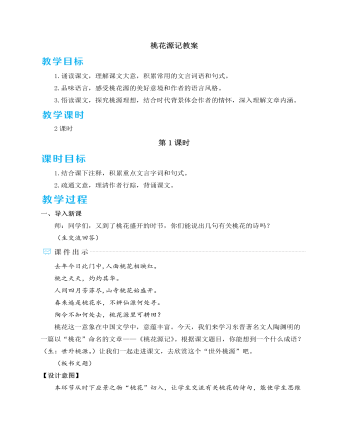
人教部编版语文八年级下册我一生中的重要抉择教案
五、总结存储1.教师总结这篇演讲词,作者用幽默诙谐的语言阐述了自己人生中的一个重要抉择——大力扶植年轻人。作者善于自我调侃,在自我解剖中进行了深入的分析,强调了扶植年轻人的重要性和必要性。演讲中列举了大量名人事例进行论证,使演讲具有很强的说服力。这篇演讲词展示了一位科学家精彩绝伦的语言魅力:不但有科学原理,而且有人生哲理;不但有学术的穿透力,而且有情感的震撼力;不但有理论的清晰度,而且有语言的幽默感——这一切构成了王选演讲的独特风采。我们在体会王选演讲魅力的同时,也领略到了他的人格魅力。2.布置作业(1)人的一生所做的重要抉择,如果与时代和国家紧密相连,意义会更加重大。我们在人生的关键阶段,如选择未来事业时,会做出怎样的抉择?请你写一段200字左右的演讲词,并在小组内演讲交流。(2)课外阅读王选的《我一生中的八个重要抉择》。
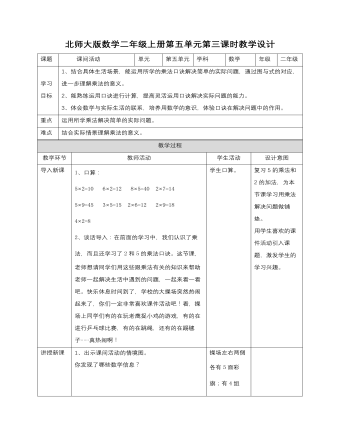
小学数学北师大版二年级上册《第三课课间活动》教案
1、结合具体生活场景,能运用所学的乘法口诀解决简单的实际问题,通过图与式的对应,进一步理解乘法的意义。 2、能熟练运用口诀进行计算,提高灵活运用口诀解决实际问题的能力。 3、体会数学与实际生活的联系,培养用数学的意识,体验口诀在解决问题中的作用。 运用所学乘法解决简单的实际问题。 结合实际情景理解乘法的意义。 1、口算: 5×2=10 6×2=12 8×5=40 2×7=14 5×9=45 3×5=15 2×6=12 2×9=18 4×2=8 2、谈话导入:在前面的学习中,我们认识了乘法,而且还学习了2和5的乘法口诀。这节课,老师想请同学们用这些跟乘法有关的知识来帮助老师一起解决生活中遇到的问题,一起来看一看吧。快乐休息时间到了,学校的大操场突然热闹起来了,你们一定非常喜欢课件活动吧!看,操场上同学们有的在玩老鹰捉小鸡的游戏,有的在进行乒乓球比赛,有的在跳绳,还有的在踢毽子……真热闹啊!
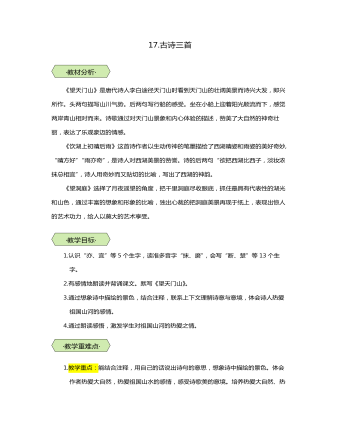
统编版三年级语文上第17课古诗三首教学设计教案
《望天门山》是唐代诗人李白途径天门山时看到天门山的壮阔美景而诗兴大发,即兴所作。头两句描写山川气势。后两句写行船的感受。坐在小船上迎着阳光顺流而下,感觉两岸青山相对而来。诗歌通过对天门山景象和内心体验的描述,赞美了大自然的神奇壮丽,表达了乐观豪迈的情感。《饮湖上初晴后雨》这首诗作者以生动传神的笔墨描绘了西湖晴姿和雨姿的美好奇妙,?“晴方好”“雨亦奇”,是诗人对西湖美景的赞誉。诗的后两句“欲把西湖比西子,淡妆浓抹总相宜”,诗人用奇妙而又贴切的比喻,写出了西湖的神韵。《望洞庭》选择了月夜遥望的角度,把千里洞庭尽收眼底,抓住最具有代表性的湖光和山色,通过丰富的想象和形象的比喻,独出心裁的把洞庭美景再现于纸上,表现出惊人的艺术功力,给人以莫大的艺术享受。 1.认识“亦、宜”等5个生字,读准多音字“抹、磨”,会写“断、楚”等13个生字。2.有感情地朗读并背诵课文。默写《望天门山》。3.通过想象诗中描绘的景色,结合注释,联系上下文理解诗意与意境,体会诗人热爱祖国山河的感情。4.通过朗读感悟,激发学生对祖国山河的热爱之情。 1.教学重点:能结合注释,用自己的话说出诗句的意思,想象诗中描绘的景色。体会作者热爱大自然,热爱祖国山水的感情,感受诗歌美的意境。培养热爱大自然、热爱祖国的情感。2.教学难点:体会诗文的内容,体会诗人的思想感情。 3课时
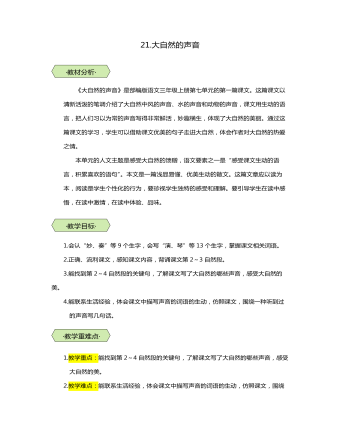
统编版三年级语文上第21课大自然的声音教学设计教案
《大自然的声音》是部编版语文三年级上册第七单元的第一篇课文。这篇课文以清新活泼的笔调介绍了大自然中风的声音、水的声音和动物的声音,课文用生动的语言,把人们习以为常的声音写得非常鲜活,妙趣横生,体现了大自然的美丽。通过这篇课文的学习,学生可以借助课文优美的句子走进大自然,体会作者对大自然的热爱之情。本单元的人文主题是感受大自然的馈赠,语文要素之一是“感受课文生动的语言,积累喜欢的语句”。本文是一篇浅显易懂、优美生动的散文。这篇文章应以读为本,阅读是学生个性化的行为,要珍视学生独特的感受和理解。要引导学生在读中感悟,在读中激情,在读中体验、品味。 1.会认“妙、奏”等9个生字,会写“演、琴”等13个生字,掌握课文相关词语。2.正确、流利课文,感知课文内容,背诵课文第2~3自然段。3.能找到第2~4自然段的关键句,了解课文写了大自然的哪些声音,感受大自然的美。4.能联系生活经验,体会课文中描写声音的词语的生动,仿照课文,围绕一种听到过的声音写几句话。 1.教学重点:能找到第2~4自然段的关键句,了解课文写了大自然的哪些声音,感受大自然的美。2.教学难点:能联系生活经验,体会课文中描写声音的词语的生动,仿照课文,围绕一种听到过的声音写几句话。 2课时
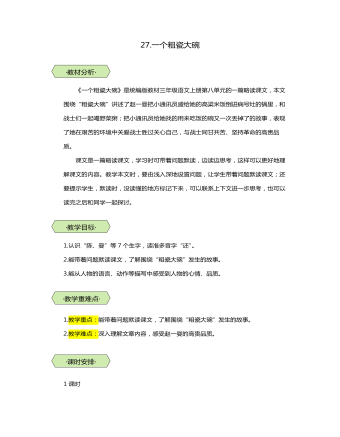
统编版三年级语文上第27课一个粗瓷大碗教学设计教案
《一个粗瓷大碗》是统编版教材三年级语文上册第八单元的一篇略读课文,本文围绕“粗瓷大碗”讲述了赵一曼把小通讯员盛给她的高粱米饭倒进病号灶的锅里,和战士们一起喝野菜粥;把小通讯员给她找的用来吃饭的碗又一次丢掉了的故事,表现了她在艰苦的环境中关爱战士胜过关心自己,与战士同甘共苦、坚持革命的高贵品质。课文是一篇略读课文,学习时可带着问题默读,边读边思考,这样可以更好地理解课文的内容。教学本文时,要由浅入深地设置问题,让学生带着问题默读课文;还要提示学生,默读时,没读懂的地方标记下来,可以联系上下文进一步思考,也可以读完之后和同学一起探讨。 1.认识“陈、曼”等7个生字,读准多音字“还”。2.能带着问题默读课文,了解围绕“粗瓷大碗”发生的故事。3.能从人物的语言、动作等描写中感受到人物的心情、品质。 1.教学重点:能带着问题默读课文,了解围绕“粗瓷大碗”发生的故事。2.教学难点:深入理解文章内容,感受赵一曼的高贵品质。 1课时
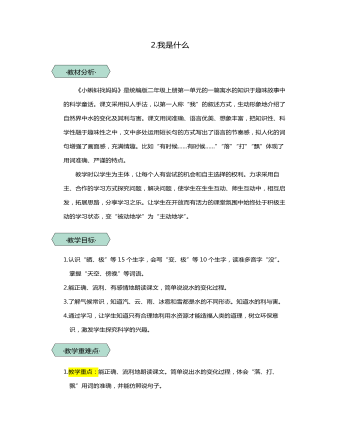
统编版二年级语文上第2课我是什么教学设计教案
《小蝌蚪找妈妈》是统编版二年级上册第一单元的一篇寓水的知识于趣味故事中的科学童话。课文采用拟人手法,以第一人称“我”的叙述方式,生动形象地介绍了自然界中水的变化及其利与害。课文用词准确、语言优美、想象丰富,把知识性、科学性融于趣味性之中,文中多处运用短长句的方式写出了语言的节奏感,拟人化的词句增强了画面感,充满情趣。比如“有时候……有时候……”“落”“打”“飘”体现了用词准确、严谨的特点。教学时以学生为主体,让每个人有尝试的机会和自主选择的权利。力求采用自主、合作的学习方式探究问题,解决问题,使学生在生生互动、师生互动中,相互启发,拓展思路,分享学习之乐。让学生在开放而有活力的课堂氛围中始终处于积极主动的学习状态,变“被动地学”为“主动地学”。 ·教学目标· 1.认识“晒、极”等15个生字,会写“变、极”等10个生字,读准多音字“没”。掌握“天空、傍晚”等词语。2.能正确、流利、有感情地朗读课文,简单说说水的变化过程。3.了解气候常识,知道汽、云、雨、冰雹和雪都是水的不同形态。知道水的利与害。4.通过学习,让学生知道只有合理地利用水资源才能造福人类的道理,树立环保意识,激发学生探究科学的兴趣。 ·教学重难点· 1.教学重点:能正确、流利地朗读课文。简单说出水的变化过程,体会“落、打、飘”用词的准确,并能仿照说句子。2.教学难点:了解气候常识,知道汽、云、雨、冰雹和雪都是水的不同形态。知道水的利与害。
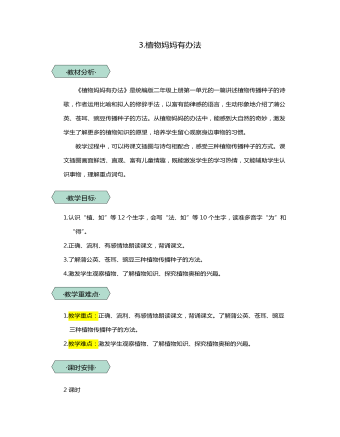
统编版二年级语文上第3课植物妈妈有办法教学设计教案
《植物妈妈有办法》是统编版二年级上册第一单元的一篇讲述植物传播种子的诗歌,作者运用比喻和拟人的修辞手法,以富有韵律感的语言,生动形象地介绍了蒲公英、苍耳、豌豆传播种子的方法。从植物妈妈的办法中,能感到大自然的奇妙,激发学生了解更多的植物知识的愿望,培养学生留心观察身边事物的习惯。教学过程中,可以将课文插图与诗句相配合,感受三种植物传播种子的方式。课文插图画面鲜活、直观、富有儿童情趣,既能激发学生的学习热情,又能辅助学生认识事物,理解重点词句。 1.认识“植、如”等12个生字,会写“法、如”等10个生字,读准多音字“为”和“得”。2.正确、流利、有感情地朗读课文,背诵课文。3.了解蒲公英、苍耳、豌豆三种植物传播种子的方法。4.激发学生观察植物、了解植物知识、探究植物奥秘的兴趣。 1.教学重点:正确、流利、有感情地朗读课文,背诵课文。了解蒲公英、苍耳、豌豆三种植物传播种子的方法。2.教学难点:激发学生观察植物、了解植物知识、探究植物奥秘的兴趣。 2课时
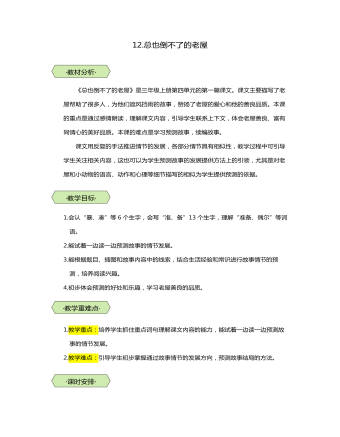
统编版三年级语文上第12课总也倒不了的老屋教学设计教案
《总也倒不了的老屋》是三年级上册第四单元的第一篇课文。课文主要描写了老屋帮助了很多人,为他们遮风挡雨的故事,赞扬了老屋的爱心和他的善良品质。本课的重点是通过感情朗读,理解课文内容,引导学生联系上下文,体会老屋善良、富有同情心的美好品质。本课的难点是学习预测故事,续编故事。课文用反复的手法推进情节的发展,各部分情节具有相似性,教学过程中可引导学生关注相关内容,这也可以为学生预测故事的发展提供方法上的引领,尤其是对老屋和小动物的语言、动作和心理等细节描写的相似为学生提供预测的依据。 1.会认“暴、凑”等6个生字,会写“准、备”13个生字,理解“准备、偶尔”等词语。2.能试着一边读一边预测故事的情节发展。3.能根据题目、插图和故事内容中的线索,结合生活经验和常识进行故事情节的预测,培养阅读兴趣。4.初步体会预测的好处和乐趣,学习老屋善良的品质。 1.教学重点:培养学生抓住重点词句理解课文内容的能力,能试着一边读一边预测故事的情节发展。2.教学难点:引导学生初步掌握通过故事情节的发展方向,预测故事结局的方法。 2课时
